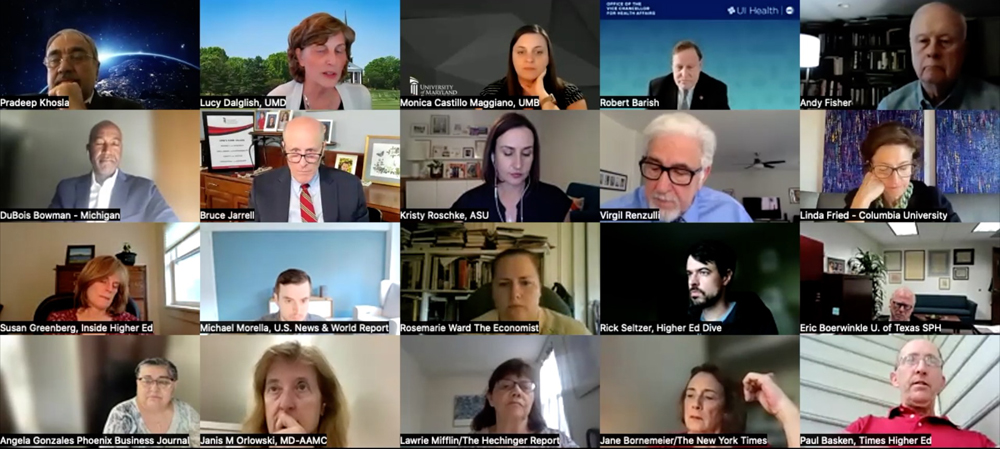June 2022
More than two dozen leaders in academic health and journalists who follow and write about public health issues engaged in a wide-ranging discussion of the lessons learned during the past two-plus years of the COVID-19 pandemic during a two-hour virtual event hosted by University of Maryland, Baltimore (UMB) President Bruce E. Jarrell, MD, FACS, on June 15.
“As terrible as COVID has been, there have been many positives, and I’ve seen them in our academic health center. We have made huge advances in science, both the prevention and the treatment of this disease and understanding the molecular mechanisms,” Jarrell told the group. “I think we are more prepared than yesterday for another health crisis.
“But I think we’ve learned something much deeper than just the scientific part,” he added. “We’ve learned the high importance of building trust with our community. Where that trust had been forged by close collaboration with neighborhood partners, community members were open to information about the pandemic and receiving vaccines.”

More than two dozen experts and journalists gathered to discuss Lessons Learned from the COVID-19 Pandemic.
The other experts also shared their experiences — what worked and what didn’t — as well as bottom-line conclusions.
“Our nation, if not the world, now understands that public health is a critical societal investment, that we need it at its best, and that we have disinvested in it for 60 years in the United States,” said Linda P. Fried, MD, MPH, epidemiologist and dean of Columbia University’s Mailman School of Public Health.
Questions from journalists also prompted discussion of the pandemic’s impact beyond direct challenges to health.
“Women took the burden of being at home to help with either education of their children or to be home with an elderly parent, and we have seen a dramatic and important shift of women workers,” said Janis M. Orlowski, MD, MACP, chief health care officer with the Association of American Medical Colleges. “I know as we take a look at academic medical institutions across the United States, this is a common theme of how to help women physicians, women educators, women scientists, to continue their careers.”
“I’m not going to repeat what’s been said, but I want to point out the importance of new partnerships that were formed between academic public health and government public health, between public health and health care, which have been traditionally siloed,” said Eric Boerwinkle, PhD, dean of the University of Texas School of Public Health. “Build off of them. The world has a lot of problems in terms of chronic disease, behavioral health, violence, I could go on and on.
“And I think what would really benefit us is if we can take all of the good things that have come out of COVID, even though it’s been a very difficult experience, and steer them to other problems, other public health problems in particular. I think we have an opportunity to really make a very lasting impact. And I think that’s the challenge that we should all really rise to.”
To watch the entire discussion, follow the link at the top of the page.
The experts panel included:
- Bruce E. Jarrell, MD, FACS, president, UMB (host and moderator)
- Robert Barish, MD, vice chancellor for health affairs, professor of emergency medicine, University of Illinois, Chicago
- Eric Boerwinkle, PhD, dean, University of Texas School of Public Health
- DuBois Bowman, PhD, dean, University of Michigan School of Public Health
- Lucy A. Dalglish, JD, dean, Philip Merrill College of Journalism, University of Maryland, College Park (UMCP)
- Linda P. Fried, MD, MPH, epidemiologist and dean, Mailman School of Public Health, Columbia University
- Pradeep K. Khosla, PhD, chancellor, University of California, San Diego
- Deborah Nelson, JD, professor of investigative journalism, Philip Merrill College of Journalism, UMCP
- Janis M. Orlowski, MD, MACP, chief health care officer, Association of American Medical Colleges
- Kristy Roschke, media literacy expert and director of the News Lab at the Cronkite School of Journalism and Mass Communication
The journalists present included:
- Liz Adeola, producer/host, PBS Utah
- Paul Baskin, Times Higher Education
- Jane Bornemeier, The New York Times
- Angela Gonzales. Phoenix Business Journal
- Susan Greenberg, Inside Higher Ed
- Lawrie Mifflin, Hechinger Report
- Michael Morella, U.S. News & World Report
- Katie Reilly, Time
- Rick Seltzer, Higher Ed Dive
- Rosemarie Ward, The Economist
Search UMB News
Sign up for UMB Alerts.



